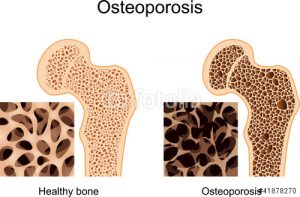Osteoporosis

Osteoporosis (totally different from osteoarthritis!) is the term that describes loss of calcium from bone. Loss of calcium from bone is like losing bricks from a wall. The more bricks the wall loses, the weaker it becomes, and eventually the wall can crumble. Bones “crumble,” too…they fracture. There are many causes of osteoporosis, but by far the most common is the loss of estrogen, the female hormone, that occurs in women at menopause. Without estrogen, calcium begins leaching out of bone, and how fast this occurs is determined by genetics, smoking, alcohol consumption, diet, exercise, and some other factors. Sadly, only 1/6th of patients nationwide with osteoporosis are ever evaluated or treated for this common disorder. As a result, about 50% of post-menopausal women in the USA suffer osteoporosis-related fractures in their lifetimes…virtually all of which are preventable!
In addition to treating carpal tunnel syndrome, Dr. Malone specializes in the evaluation and treatment of osteoporosis at his Columbus, Wisconsin location. He spent 7 years in the osteoporosis clinic at the University of Wisconsin, evaluating and treating patients alongside several of the world’s most well-known osteoporosis researchers and clinicians. He is up-to-date on all of the available medications, and he is qualified to read DEXA scans, the X-ray tool used to estimate bone mineral content and future fracture risk.
Factors that increase risk of osteoporosis and osteoporosis-related fracture:
- Cigarette smoking
- Consumption of more than 3 alcoholic drinks per day
- Poor diet, with inadequate intake of calcium and Vitamin D
- Lack of exercise
- Family history of osteoporosis
- Personal history of fracture from osteoporosis
- Intestinal conditions that interfere with normal intestinal absorption
- Certain medications, especially corticosteroids
Should I take Calcium and Vitamin D?
There is controversy about how much calcium and Vitamin D a person should take, especially how much calcium. Dr. Malone recommends that a person take 2000 IU (international units) of vitamin D3 per day, and this is sold in all drug and grocery stores without a prescription. This dose is right for most, but not all, people. In some cases doses must be individualized to account for poor absorption and other factors.
Calcium is found in greatest quantity in dairy products…milk, cheese, yogurt, cottage cheese, etc. There is VERY LITTLE calcium in other non-dairy foods, including broccoli. It would require intake of a huge amount of broccoli daily to provide sufficient calcium for good bone health, especially in post-menopausal women. If a person cannot tolerate dairy products, it may be necessary to use a calcium supplement pill of 600-1200 mg a day. In Dr. Malone’s opinion, for people who use dairy products in their daily diet, and who do not have intestinal conditions that interfere with normal absorption, calcium supplement pills are probably NOT necessary.
